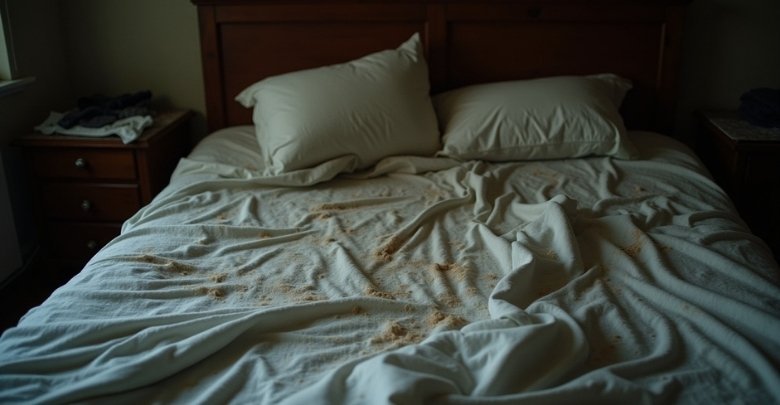You sleep better when you have soft bed sheets, as they provide a comfortable surface for a restful night. But have you ever wondered, How Often Should You Wash Your Sheets?
Washing your sheets once a week is generally recommended, but certain factors may require more frequent washing. For those with allergies or asthma, washing sheets every 3 to 4 days can reduce exposure to allergens. If you have pets in your bed, sweat excessively, or are recuperating from an illness, more frequent washing can improve hygiene and prevent odors.
To learn more about how often you should wash the sheets based on the needs and lifestyle of your family, read on.
How Often Should You Wash Your Sheets? (Cleaning Factors)
You should usually wash your sheets once a week. Sheets may look clean, but they collect sweat, dirt, and germs over time. Some things can make you wash them more often than usual. Check below to know what those things are.

Allergies or Asthma
If you have a stuffy nose or sneeze a lot, it could be from dust in your bed. Tiny bugs called dust mites love to live in sheets and pillows. Washing your sheets every 3–4 days can help reduce this. Clean sheets make it easier to breathe and sleep well. It’s a simple way to feel better at night.
Pets in Bed
Sleeping with pets can be cozy, but they bring hair and dirt into your bed. Even clean pets leave behind fur, dander, and sometimes even drool. This can make your bed messier and harder to keep fresh. If your pets sleep with you, try washing your sheets more than once a week. This helps keep things clean and smelling nice.
Heavy Sweating
Some people sweat a lot when they sleep, especially in hot weather. Sweat can soak into your sheets and make them smell bad over time. It can also leave stains and help germs grow. If this happens to you, washing your sheets more often can help. You’ll feel better sleeping on clean, dry fabric.
Hot Weather
During warmer months, your body gets hotter, and you may sweat more in your sleep. That sweat makes your sheets dirty quicker than usual. Washing them more often helps you stay cool and fresh. It also helps prevent skin problems like pimples or rashes. So, when the weather heats up, your laundry might need to as well.
Illness or Recovery
When you’re sick, your body gives off more germs and sweat while resting. Those germs can stay on your sheets, even after you start feeling better. Washing them every few days can stop sickness from spreading. It also helps your bed feel clean and comfortable again. A fresh bed can even help you heal faster.
Eating in Bed
Snacking in bed might seem fun, but crumbs and spills can attract bugs. Food bits can also make your sheets dirty and sticky. If you eat in bed often, wash your sheets more to avoid smells and stains. Clean bedding makes your room feel nicer overall. It’s better to keep your sheets fresh and free from food mess.
Skin Problems
If you have acne or skin rashes, your sheets could be making things worse. Dirty sheets can hold oil, sweat, and bacteria that touch your skin. Washing them often helps keep your skin clean and clear. This is especially helpful if you have sensitive skin. Fresh sheets can really make a difference in how your skin feels.
Best Way to Maintain Your Sheet to Avoid Hygiene Risks
The sheets you sleep on touch your skin every night, so they have to be clean at all times. Dirty sheets can cause smells, skin problems, and even make you sick. Taking care of them doesn’t have to be hard or boring. Here’s how to do it right.

Wash Sheets Regularly
Washing your sheets once a week is a good habit to follow. If you sweat a lot, have pets, or are sick, try washing them more often. Use warm water to kill germs and remove dirt. Don’t forget to also wash pillowcases and blankets. Clean sheets help you sleep better and feel fresh.
Choose Good Detergent
Use a gentle detergent that won’t hurt your skin. Some detergents smell nice but can be too strong and leave stuff behind on your sheets. A clean rinse is just as important as the wash. If you have sensitive skin, go for something labeled “mild” or “for sensitive skin.” This helps you avoid rashes or itchiness.
Dry Sheets Properly
After washing, dry your sheets all the way through. Damp sheets can grow mold or smell musty. It’s best to dry them under the sun or in a clean dryer. Make sure they feel totally dry before folding or using them. This step keeps your bed fresh and safe.
Use Helpful Tools
Sheets can slip off the bed while you sleep. You can use tools like corner clips or try bed scrunchie, an advanced strap that holds sheets tight. It keeps everything in place, even on thick mattresses. This helps your bed stay neat and comfy.
Keep Pets Off
It’s fun to cuddle with pets, but they carry hair, dirt, and germs into your bed. Even clean pets leave fur and drool behind. Try giving your pets their own space to sleep. If they do sleep on your bed, wash your sheets more often. Clean sheets are better for both you and your pets.
No Food in Bed
Eating in bed might seem cozy, but it can make a big mess. Crumbs fall into your sheets and can bring bugs. Spills are also hard to clean and might leave stains. Try to keep food in the kitchen or the living room instead. This helps your sheets stay cleaner for longer.
Change Sheets Often
Even if your sheets look clean, they can still hold sweat, oils, and dust. Changing them at least once a week is a simple way to avoid this. Keep an extra set ready so it’s easy to swap them out. Fresh sheets feel nicer and help you sleep better. A quick change makes a big difference.
Hygiene Issues You Might Face If You Are Not Careful with Your Sheets
Dirty sheets may look fine, but they can quietly cause several health and skin problems. Sweat, dust, and germs build up fast. Let’s look at what could happen if you don’t clean your sheets regularly.
- Skin Breakouts: Oil, sweat, and dirt collect on your sheets, which can clog your pores. This may lead to acne and skin irritation.
- Bad Odors: Unwashed sheets trap body smells, sweat, and other odors. Over time, your bed can start to smell musty or unpleasant.
- Allergy Problems: Dust mites live in dirty sheets and can make allergies worse. You may start sneezing, coughing, or having itchy eyes.
- Poor Sleep Quality: Sleeping on sweaty or dusty sheets can feel uncomfortable. This can cause tossing, turning, and less restful sleep overall.
- Fungal Infections: Warm, damp sheets are perfect for fungus to grow. This can lead to athlete’s foot or other skin infections easily.
- Weakened Immune System: Germs from dirty sheets may stress your body more over time. That makes it easier to catch colds or infections.
- Respiratory Issues: Breathing in dust, mold, or pet dander from sheets can affect your lungs. It might make asthma or breathing harder.
- Bug Infestations: Bugs like bed bugs love dirty, dark spaces like unwashed sheets. They can bite and make your sleep very uncomfortable.
How Bed Scrunchie Helps You Maintain Your Bed Sheet?
It can be difficult to keep your bed neat when your sheets keep slipping off. No one wants to wake up on a messy mattress. There’s a simple tool that can help with this problem. Keep reading to see how Bed Scrunchie can make your bed better.
Holds Sheets Tight
Bed Scrunchie pulls your sheets from all sides to make them tight and flat. It’s one of the easiest ways to keep sheets tight on bed without slipping or bunching. It wraps around your mattress like a belt and holds everything in place. This makes your bed look clean all the time. It also feels better when you sleep.
Works on All Beds
You can use a bed scrunchie on any size bed, even thick or odd-shaped ones. It fits everything from twin to king-size. You don’t need to buy special sheets either. Just clip it to your regular fitted sheet. It still works great and keeps things in place.
Easy to Use
You don’t need tools or extra help to set it up. Just attach the clips, pull the cord, and it’s done. Once it’s on, you don’t need to remove it when washing the sheet. That saves you time every week. It’s quick and simple for anyone to use.
Saves You Time
No more fixing your sheets every morning. With a bed scrunchie, you set it once and forget it. It keeps everything tucked in, even if you move a lot while sleeping. That means less time fixing your bed and more time doing fun stuff. It really makes your life easier.
Makes Bed Look Neat
A messy bed can make your whole room look untidy. A bed scrunchie keeps your sheets smooth and tight all day. Your bed stays neat without wrinkles or corners popping up. It’s a small change that makes your room feel cleaner. A tidy bed can even improve your mood.
Helps With Hygiene
Loose sheets can collect dirt and trap sweat in folds. Bed scrunchie keeps your sheets flat so they stay cleaner longer. You won’t have to wash them as often due to bunching or slipping. It also helps keep bugs and dust away. A tight sheet is a cleaner sheet.
Who Needs to Wash Their Bed Sheets More Often?
Not everyone needs to wash their sheets on the same schedule. Some habits or daily routines can make sheets dirty faster. If you do any of these things, you might want to wash your sheets more often. Read on to see if your bed needs extra cleaning.

Gym-Goers or Athletes
If you work out often, you probably sweat more, even while sleeping. That extra sweat and body oil can soak into your sheets. It can also lead to bad smells and skin problems. Washing your sheets more often keeps things fresh. It’s a simple way to feel clean after a long day.
Parents of Young Kids
Kids often bring messes, spills, dirt, and sticky fingers even into your bed. If you co-sleep or cuddle with your child, your sheets get dirty quicker. Washing your sheets more helps remove germs and stains. It’s better for your comfort and your child’s health as well. A clean bed is safer for everyone.
Makeup Sleepers
Going to bed with makeup can stain your pillowcases and sheets. Makeup also traps oil and dirt, which can stick to your bedding. That mess builds up fast and can irritate your skin. If you don’t remove makeup before bed, wash your sheets more often. It helps your face and bed stay cleaner.
Smokers
Smoke sticks to your clothes, hair, and skin and ends up in your bed. Over time, it gives your sheets a bad smell and makes them yellow. Washing them more often can help get rid of the odor. It also helps your room smell fresh. Clean sheets are nicer to sleep on.
Frequent Hotel Guests
You may not know how clean the bedding is in hotels. While sheets are usually changed, comforters aren’t always washed often. That’s why it’s smart to check or ask about comforter washing practices in hotels before settling in. If you travel a lot, washing your own sheets more often is a good habit. It helps you stay clean and avoid bringing germs back home.
Outdoor Workers
If you spend a lot of time outside, you bring in more dust and dirt. That ends up on your clothes, then onto your bed. Even if you shower, extra dust may still stick around. Wash your sheets more often to keep your bed clean. Your sleep will feel better too.
People Who Sleep Naked
Without pajamas or clothes, your skin touches the sheets directly. That means more sweat, oils, and dead skin end up on the fabric. It’s a natural thing, but it makes your sheets dirty faster. Washing them often helps keep your bed fresh. You’ll feel cleaner and more comfortable at night.
FAQs About How Often Should You Wash Your Sheets?
Washing your bed sheets may sound simple, but there’s more to it than just tossing them in the wash. People often have questions about the right way, time, and reasons to clean their sheets properly. Here are some common questions and helpful answers that go beyond the basics.
How Does Washing Sheets Affect Sleep Quality?
Washing your sheets regularly can improve your sleep by keeping your bed fresh, soft, and free from irritants. Dirty sheets may trap sweat, dust, and bacteria, which can cause discomfort and poor sleep. Clean bedding feels better on the skin and can help you fall asleep faster. A fresh bed can actually boost how well you rest at night.
Can Dirty Sheets Trigger Skin Conditions?
Yes, unwashed sheets can collect sweat, dead skin, and oils that irritate your skin. This build-up can clog pores and lead to breakouts, especially if you already have sensitive skin. Washing sheets often helps reduce the risk of rashes and acne. It’s a simple way to take better care of your skin.
Do Pillowcases Need More Frequent Washing Than Sheets?
Pillowcases touch your face and hair directly every night, so they tend to get dirtier faster than sheets. It’s a good idea to wash them every 2–3 days to keep oils and bacteria from building up. Frequent washing can also help reduce acne and skin irritation. This keeps your face cleaner while you sleep.
How Can I Tell If My Sheets Are Dirty Even If They Look Clean?
Sheets may not always show dirt, but they collect sweat, skin flakes, and dust quickly. If your bed starts to smell or feel greasy, it’s time to wash it. Even without visible stains, washing weekly is a safe routine. Trust how your bed feels and smells, not just how it looks.
Should I Wash Sheets Separately From Other Laundry?
Yes, washing sheets separately is a good idea because it gives them more space to move and get fully clean. Mixing them with heavy items like towels can make them tangle or wash unevenly. Separate loads also prevent lint transfer. This helps keep your sheets soft, smooth, and properly cleaned.
What Temperature Is Best for Washing Sheets?
Warm water is usually best for washing sheets as it removes body oils and kills bacteria without shrinking the fabric. Hot water is better for deep cleaning if you’re sick, but it may damage delicate materials. Always check your care label first. Warm water is a safe, balanced option for most cases.
Can Washing Sheets Too Often Damage Them?
Washing sheets very often may cause them to wear out faster, especially if the water is hot or the detergent is strong. Use a gentle cycle and mild detergent to help them last longer. It’s all about balancing cleanliness with fabric care. Once a week is safe for most materials.
Can Washing Sheets Help With Dust Control?
Yes, sheets collect dust quickly, especially in homes with carpets or open windows. Washing them removes fine dust particles that you might not even see. This keeps your bed and room cleaner overall. It’s an easy way to reduce the amount of dust you breathe in.
Final Thoughts
Your bed is more than just a place to sleep—it’s where you rest, relax, and recharge. That’s why keeping your sheets clean isn’t just a task, it’s part of feeling good every day. Fresh sheets can help you sleep better, feel healthier, and wake up happier.
So, how often should you wash your sheets? Once a week is a great rule to follow, but your lifestyle might mean you need to wash them more often. If you sweat a lot, have pets, allergies, or just love midnight snacks in bed, more frequent washes can make a big difference.
A clean bed really does help you feel more at ease. Don’t forget to keep your sheets fresh, your space tidy, and comfortable – you deserve all of that. Looking for a better night’s sleep? A good bed starts with a good sheet.






